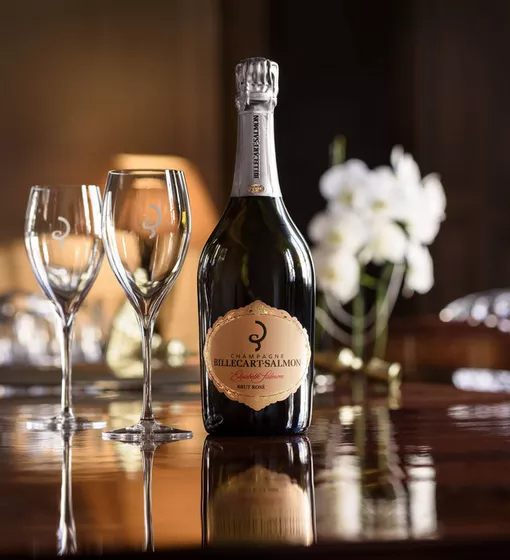Mathieu Roland-Billecart: lucky number seven for Champagne Billecart-Salmon
Author: Alexandra Gray de Walden

Champagne Billecart-Salmon is one of the region’s longest-standing family-owned estates. Alexandra Gray de Walden spoke to Mathieu Roland-Billecart, seventh generation member of the family, about their latest release: the 2009 Elisabeth Salmon rosé.
Founded in 1818 by Nicolas-François Billecart, Champagne Billecart-Salmon is one of the few remaining Champagne Houses still owned and overseen by the founding family. As the seventh generation of his family, you could expect this responsibility to weigh heavily upon Mathieu Roland-Billecart. Conversely, he seems to relish it. Not unlike his wines, he is energetic, ebullient and has an infectious passion for, as he says, “striving for excellence”.
LOOKING TO THE FUTURE
“The only pressure is the pressure we put on ourselves” Mathieu says. “I tell the team that last year we made exceptional wines and this year, I want them to be even more exceptional. We are determined to make sure the quality keeps progressing.”
Progressing and improving quality is all well and good when making bread or designing cars but wine is both an art and science. Without the capabilities to control or foresee the weather and disease pressures with absolute accuracy, how can “exceptional” be improved?
“Fundamentally, wine is about man adapting to nature.” Mathieu answers. “You need to be really humble. Nature is extremely generous so next year, we may have an amazing harvest with the least rain we’ve ever seen.” As the hottest year on record in Champagne, 2022 was particularly challenging for the region’s producers. “It could also be the easiest year we’ve ever had.” Mathieu continues. “There was no disease in the vineyard which in Champagne is unheard of!”
SUSTAINABILITY AT CHAMPAGNE BILLECART-SALMON
As global warming tightens its grip, these hotter, drier vintages will become more common for wine regions across the globe. The team at Champagne Billecart-Salmon have already been reviewing their vineyard and winemaking practices for several years to ensure their longevity.
“We prune differently; we plough the soil in a way we haven’t done before. We remove some leaves on the sunrise side of the vines to increase aeration.” It was under Mathieu’s leadership that the decision was made to stop using weedkillers, out of respect for the soil. He favours the adage of prevention over cure and has made great progress in exploring plant-based treatments for vines. Using agroforestry and co-planting increases the biodiversity around the vines to prevent them succumbing to disease. “We adapt to each individual parcel [of vines]. Whatever makes my vines as strong as possible.”
Mathieu’s idea of sustainability doesn’t begin and end with the Billecart-Salmon vineyards. Having launched the Foundation Billecart-Salmon, he has two key charitable objectives in the local area; food inequality and positive environmental change. “A certain percentage of the sales from our Clos St. Hilaire cuvée goes into charity in the Foundation. That will outlive me. I’ve structured it in a way which will outlast any generation.”
THE IMPORTANCE OF FAMILY
Indeed, Billecart-Salmon have already outlasted any generation for over two centuries, just as Berry Bros. & Rudd have. Does working with a merchant of similarly lengthy heritage and family-oriented operation help when it comes to the business of Champagne? Mathieu certainly thinks so.
“It’s trust. Being family owned, working with similar values, it becomes easy. What stands out more with our relationship with you is the length – we’ve known the great years and the terrible years together. It’s about value and longevity.” And just how far back does this lengthy and like-minded working relationship stretch? “If I asked my Great Uncle when we started working with Berry Bros. & Rudd, he would say he can’t remember. And he’s 99 years old!”
THE ELISABETH SALMON ROSÉ
We speak to Mathieu a few weeks before the release of the 2009 Elisabeth Salmon rosé – a cuvée with beautiful redcurrant and cream notes. Named after Mathieu’s four-times great grandmother and only released in the very best years, the cuvée’s first vintage (1988) was borne out of customer demand. “People kept saying we had a great brut rosé non-vintage and asking why we didn’t make a prestige rosé. What do you want from a prestige cuvée? Additional complexity, additional longevity because it’s made to keep longer. And with that came the construction of a slightly different blend.”
Choosing to make the Elisabeth Salmon a Chardonnay/Pinot Noir blend, with no Pinot Meunier, increased the blend’s concentration and added complexity and a touch of spice to its savoury finish. Aged longer on the lees than the Brut Rosé, it is a wine for fans of richer, more voluptuous Champagnes. “She is the Queen of Rosé,” Mathieu analogises. “I often say the Brut Rosé is the Princess. It’s fruity, fun, approachable. She’s dancing through the night with less responsibility. Then Elisabeth Salmon, The Queen, she has different levels of responsibility and the weight of complexity and length that comes with it.”
And what dishes, fit for a Queen, would Mathieu recommend to pair with the Elisabeth Salmon rosé? “If somebody else is cooking, then red snapper. Any of the more meaty fish or a spicy lobster curry which goes with the slight spice in the finish. But frankly, in the simplest sense? Pizza.”
What is abundantly clear from spending any time with Mathieu is his desire for his wines to do the talking. They are what you remember from a gregarious dinner with friends and they are the reason Mathieu does what he does. “We owe everything to the drinker; the person opening the bottle, pouring it, taking a sip and smiling.”
Find out more about the 2009 Elisabeth Salmon here, or read our other articles on Champagne.


